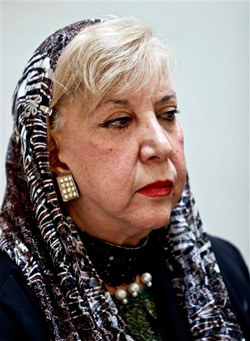Iranian poet’s death sparks Stanford recollections

When Iranian poet SIMIN BEHBAHANI died on Aug. 19 at age 87, it rekindled fond remembrances of her numerous visits to the Stanford campus.
An icon of the Iranian literary community, Behbahani was dubbed the “lioness of Iran.” Her poems are quoted like aphorisms and proverbs in her country.
ABBAS MILANI, director of the Hamid and Christina Moghadam Program in Iranian Studies, said Behbahani visited Stanford several times.
“Hers was a voice of poetic innovation and political independence that defied constraints and broke cultural barriers,” he said.
In 2008, Behbahani won Stanford’s Bita Prize for Literature and Freedom, a $10,000 award that supports teaching, research and scholarship related to Iran and Persian heritage.
“When we launched the Bita Prize,” Milani said, “there was no doubt in anyone’s mind that she, more than any other living Iranian artist, deserved to be its first recipient.”
He recalled the “gracefully defiant dignity of her character, her relentless defense of artistic freedom and the power and poignancy of her poetry.” It left an “enduring impact,” Milani said, on all at Stanford who heard Behbahani talk or read her poetry.
In her work – she began writing at age 12 – Behbahani explored Persian verse forms. She focused on the traditional ghazal form, which she elevated to new lyrical heights – but with a modern voice and perspective, Milani said.
A leading dissident, she won numerous awards for her struggle for freedom of expression in Iran, and was nominated twice for the Nobel Prize in literature. The Iranian government once barred her from leaving the country.
Milani said on her first visit to Stanford, Behbahani read in Persian her prose poem about the “unrealized dreams” of the 1979 revolution in Iran and the problems of censorship.
“When she finished,” Milani said, “George P. Shultz [now the Thomas W. and Susan B. Ford Distinguished Fellow at the Hoover Institution], who was in the audience, came to the podium and said, ‘Though I speak no Persian, I was moved to tears by the sincerity and power of your voice.'”
Milani said that particular prose poem will soon be published in a collection of essays he has edited with Larry Diamond, a senior fellow at the Hoover Institution and the Freeman Spogli Institute for International Studies.
—CLIFTON B. PARKER

